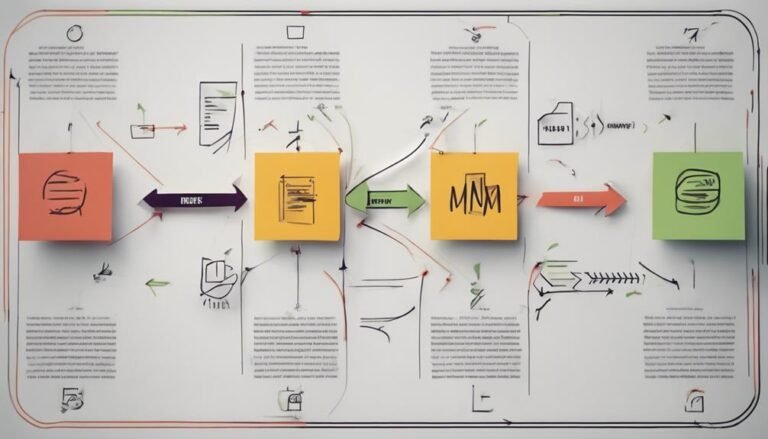Efficiency Tools for Small Businesses
In the fast-paced world of small businesses, the quest for efficiency is paramount. Utilizing the right tools can make a significant difference in streamlining operations, enhancing productivity, and ultimately boosting profitability.
From project management software to automation solutions, the options for small businesses are abundant. How can these tools transform the way you operate and elevate your business to new heights of success?
Let's explore the top efficiency tools tailored for small businesses and unlock their potential for growth and optimization.
Key Takeaways
- Project management tools aid in task assignment, progress tracking, and team collaboration for small businesses.
- Communication platforms enhance remote work by facilitating real-time communication and file sharing.
- Time tracking solutions improve productivity by identifying time-consuming tasks and providing accurate reports.
- CRM systems centralize customer data, enhance relationships, and offer insights for targeted marketing in small businesses.
Project Management Software
To effectively streamline tasks and enhance organization within a small business, utilizing project management software is essential. Task management becomes more efficient with features such as task assignment, deadlines, and progress tracking. These tools allow for the creation of task lists, prioritization of activities, and monitoring of task completion, ensuring that projects stay on schedule.
Additionally, project management software facilitates team collaboration by providing a centralized platform for communication, file sharing, and updates on project statuses. Through real-time collaboration features, team members can work together seamlessly, share feedback, and stay informed about project developments. By promoting transparency and accountability, project management software fosters a culture of teamwork and ensures that everyone is on the same page.
Communication Platforms
Utilizing efficient communication platforms is crucial for fostering seamless interactions and enhancing collaboration within a small business environment. Video conferencing has become a cornerstone tool for businesses, enabling face-to-face meetings regardless of physical location. Platforms like Zoom, Microsoft Teams, or Google Meet offer features such as screen sharing, recording capabilities, and virtual backgrounds, enhancing communication and productivity.
Instant messaging platforms like Slack or Microsoft Teams facilitate quick exchanges, reducing the need for lengthy email threads. These tools provide real-time communication, file sharing, and the creation of specific channels for different teams or projects. By utilizing instant messaging, employees can ask quick questions, share updates, or seek clarification promptly, fostering a more agile work environment.
Incorporating both video conferencing and instant messaging platforms into daily operations can streamline communication, increase efficiency, and boost collaboration among team members. Small businesses can leverage these tools to break down communication barriers, enhance remote work capabilities, and ensure that projects progress smoothly. By investing in robust communication platforms, small businesses can create a more connected and productive work environment.
Time Tracking Tools
Efficiently tracking time spent on tasks and projects is a fundamental aspect of optimizing productivity and performance within a small business setting. Time tracking tools play a crucial role in helping businesses monitor and analyze how time is allocated across various activities. By utilizing these tools, small businesses can enhance their productivity tracking and task management processes.
One key benefit of time tracking tools is the ability to identify time-consuming tasks that may be hindering overall efficiency. By tracking time spent on different activities, businesses can pinpoint areas where productivity can be improved, leading to better task management and resource allocation. Additionally, these tools provide valuable insights into project timelines, helping teams stay on schedule and meet deadlines effectively.
Moreover, time tracking tools enable small businesses to generate accurate reports on time spent on different projects, clients, or tasks. This data not only aids in billing clients correctly but also serves as a useful reference for future project estimations and resource planning. Overall, integrating time tracking tools into daily operations can significantly enhance productivity tracking and task management within small businesses.
Customer Relationship Management (CRM)
Implementing a robust Customer Relationship Management (CRM) system is essential for small businesses aiming to streamline customer interactions and enhance overall efficiency in managing client relationships. A CRM system allows businesses to centralize customer data, track interactions, and identify opportunities for growth.
Here are some key benefits of utilizing a CRM system:
- Improved Customer Relationships: CRM systems help businesses understand customer needs better, leading to enhanced communication and personalized interactions.
- Data Analytics: By analyzing customer data stored in the CRM system, businesses can gain valuable insights into customer behavior and preferences, enabling targeted marketing strategies.
- Enhanced Customer Retention: CRM systems aid in building long-term customer loyalty by facilitating proactive engagement and timely follow-ups.
- Efficient Task Management: With features like task scheduling and reminders, CRM systems help employees stay organized and on top of customer-related activities.
- Scalability: As businesses grow, CRM systems can adapt to changing needs and accommodate a larger customer base seamlessly.
Automation Solutions
Automation solutions play a pivotal role in enhancing operational efficiency and productivity for small businesses. By automating repetitive tasks and workflows, businesses can streamline processes, reduce manual errors, and allocate resources more effectively. Workflow optimization through automation allows employees to focus on high-value tasks that require human intervention, leading to increased output and innovation. Process streamlining, achieved through automation tools, helps small businesses adapt to changing market demands swiftly and efficiently.
To illustrate the benefits of automation solutions, consider the following table showcasing popular automation tools and their functions:
| Automation Tool | Functionality |
|---|---|
| CRM Software | Automates customer data management and communication processes. |
| Email Marketing Platform | Streamlines email campaigns, personalization, and scheduling. |
| Accounting Software | Automates financial transactions, invoicing, and reporting. |
| Project Management Tool | Optimizes task assignments, progress tracking, and collaboration. |
Conclusion
In conclusion, implementing efficiency tools such as project management software, communication platforms, time tracking tools, customer relationship management systems, and automation solutions can greatly benefit small businesses by streamlining processes and improving productivity.
By utilizing these tools effectively, small businesses can stay competitive in today's fast-paced business environment. It is imperative for small businesses to adapt and evolve with technological advancements to ensure long-term success and sustainability.
The early bird catches the worm, and in this case, early adoption of efficiency tools can give small businesses a competitive edge.







